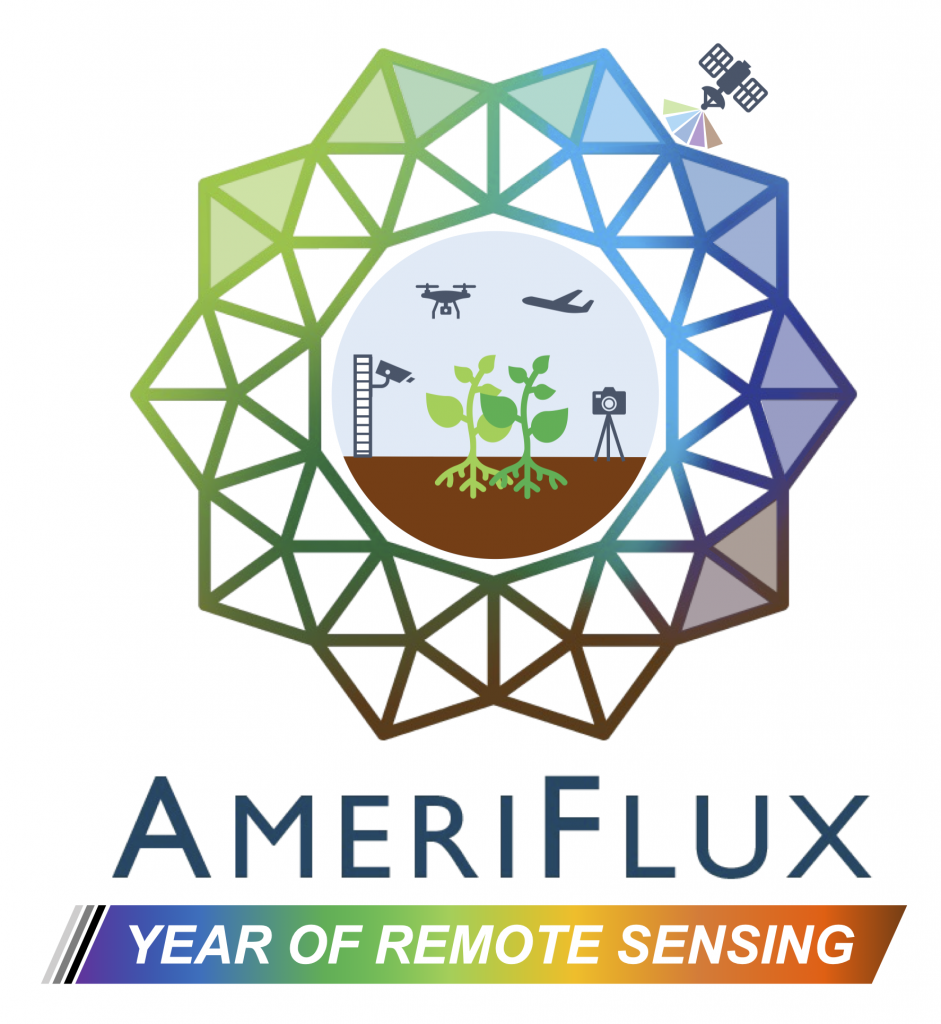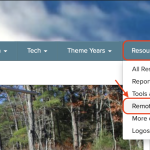
AmeriFlux Theme Year logo (Designed by Koong Yi)
The goal of the Theme Year of Remote Sensing (YoRS) is to encourage research that combines eddy covariance and remote sensing at all levels, from ground to spaceborne, throughout the AmeriFlux community. The theme-year activities are led by the AmeriFlux community (You! 😉) and supported by the AmeriFlux Management Project (AMP).
✨ New resource page: Table of Remote Sensing Products ✨

Remote sensing for various research purposes at different spatiotemporal scales. Top-left: Orbiting Carbon Observatory 3 (credit: NASA); Top-middle: An eddy covariance tower in Niwot Ridge, CO (US-NR1, credit: Christian Frankenberg); Top-right: Evaporative Stress Index in Coachella Valley, CA (credit, NASA ECOSTRESS); Bottom-left: Unmanned Aerial Vehicle equipped with a spectrometer (credit: Koong Yi); Bottom-middle: Terrestrial laser scanner to scan tree canopy structure (credit: Koong Yi); Bottom-right: Tree structure reconstructed using a terrestrial laser scanner (credit: Koong Yi).
Activities
2024
- AGU Annual Meeting
- Surface-Atmosphere Interaction: Flux Measurements for Real-World Impact [Oral & Poster sessions]
- Conveners: Rui Cheng, Bill Kustas, George Burba, Josh Fisher, Tianxin Wang
- Chairs: Nicola Falco, Sue Grimmond, Stefan Metzger, Koong Yi
- PhenoCam Training (online)
- Speakers: Darby Bergl, Oscar Zimmerman, and Mostafa Javadian from Richardson Lab at Northern Arizona University
- Part 1: Introduction to PhenoCam Network / How to navigate PhenoCam website [Oct 11]
- Part 2: Interactive data activity on a cloud platform [Oct 18]
- AmeriFlux “Luminaries” Webinar Series
- In this series, we host leading environmental and ecological scientists – true pioneers in their fields – who utilize flux and remote sensing data to advance our understanding of the Earth’s systems.
- Bill Kustas (USDA ARS) – May 24
- John Gamon (University of Nebraska-Lincoln) – June 14
- Prasad Thenkabail (USGS) – September 20
- David Schimel (NASA JPL) – TBD
- In this series, we host leading environmental and ecological scientists – true pioneers in their fields – who utilize flux and remote sensing data to advance our understanding of the Earth’s systems.
- Workshop: Remote Sensing and Fluxes Upscaling for Real-world Impact [July 9-10 @ Berkeley, CA]
- ESS PI Meeting
- Breakout session: Enhancing the Synergy Between Remote Sensing and Flux Communities for Societal Benefits [Apr 17]
- Organizers: Nicola Falco, Housen Chu, Inke Forbrich & Koong Yi
- Breakout session: Enhancing the Synergy Between Remote Sensing and Flux Communities for Societal Benefits [Apr 17]
2023
- AGU Fall Meeting
- [B076] Surface-Atmosphere Interaction: Intersections between Eddy Covariance and Remote Sensing – Oral and Poster Sessions
- Conveners: YoRS committee members (Josh Fisher, Nicola Falco, Rui Cheng & Koong Yi)
- AmeriFlux Annual Meeting
- Remote Sensing Tutorial: Early Career Day event [Oct 3]
- Instructors: Paul Stoy, Nicola Falco & Lewis Kunik
- Break-out session: Upscaling eddy covariance fluxes [Oct 4]
- Organizers: Nicola Falco & Koong Yi
- Invited lightning speakers: Housen Chu, Matthew Dannenberg, Sophia Walther
- Remote Sensing Tutorial: Early Career Day event [Oct 3]
- Workshop: Linking Optical and Energy Fluxes [Jul 12-14 @ Niwot Ridge] (Link)
- Organized by the YoRS committee members (Zoe Pierrat, Troy Magney, Loren Albert, Gilberto Pastorello, Koong Yi) and more
- Sponsored by AmeriFlux Management Project & FLUXNET co-op
- New resource page at the AmeriFlux website: Interactive table of Remote Sensing Products (Link)
- AmeriFlux Webinar Series (Watch here @ YouTube)
- We invite researchers around the world to learn the current state of the environmental sciences using remote sensing techniques and gain insight into the synergy between remote sensing techniques and eddy covariance fluxes.
- In the beginning… there was FLUXNET and MODIS – by Steven Running [Apr 21]
- Solar-induced chlorophyll fluorescence – by Lianhong Gu & Christian Frankenberg [May 17]
- Thermal remote sensing – by Mallory Barnes & Madeleine Pascolini-Campbell [Jun 9]
- Link between flux and optical measurements – by Youngryel Ryu & Kanishka Mallick [Jul 27]
- Lidar remote sensing to inform vegetation structure and its role in ecology – by Martin Béland & Xi Yang [Sep 15]
- We invite researchers around the world to learn the current state of the environmental sciences using remote sensing techniques and gain insight into the synergy between remote sensing techniques and eddy covariance fluxes.
- AmeriFlux Tutorial Series (Watch here @ YouTube)
- The purpose of this series is to introduce remote sensing to the flux community. The lectures were provided by the members of the YoRS Organizing Committee.
- Theory of remote sensing as it applies to fluxes – by Josh Fisher, Troy Magney & Zoe Pierrat [Jan 11]
- Introduction to remote sensing data acquisition tools – by Xian Wang, Tianxin Carlos Wang & Huiqi Wang [Feb 3]
- Analyzing flux and remote sensing data – by Gilberto Pastorello & Nicola Falco [Mar 10 & 17]
- The purpose of this series is to introduce remote sensing to the flux community. The lectures were provided by the members of the YoRS Organizing Committee.
2022
- AGU Fall Meeting 2022 (shown in local data & time in Chicago)
- B42A: Advances in Measuring Plant and Ecosystem Function: Toward Effective Climate Solutions I Oral [Dec 15, Thu, 07:00-08:30, McCormick Place S502ab]
- B43A: Advances in Measuring Plant and Ecosystem Function: Toward Effective Climate Solutions II Oral [Dec 15, Thu, 09:00-10:30, McCormick Place S502ab]
- B44A: Advances in Measuring Plant and Ecosystem Function: Toward Effective Climate Solutions III Online Poster Discussion [Dec 15, Thu, 11:45-12:45, Online only]
- B45F: Advances in Measuring Plant and Ecosystem Function: Toward Effective Climate Solutions IV Poster [Dec 15, Thu, 12:45-16:15, McCormick Place – Poster Hall, Hall – A]
- YoRS Open Discussion [Dec 1, 2022]
YoRS Organizing Committee
The Year of Remote Sensing Organizing Committee was formed to brainstorm theme-year-related activities that can help the community get more familiar with remote sensing products/techniques and apply them to their research. The ideas listed in the table below are only the beginning and will keep evolving. You can also be involved and contribute to our community by suggesting ideas, organizing/leading activities, and more. We would like to hear your ideas!
Strategic plan for the YoRS
| Objectives | Sub-goals | Action plan |
|---|---|---|
| Synthesize research topics integrating RS-EC | Advance science from RS/Eddy flux synergies | - Spread the word to collect input (mailing list, announcement at Annual Meeting and AGU sessions, etc.) - Host workshop for data synthesis - Create white paper/document summarizing topics, share open invitation for contributors |
| Seek feedback from ECOSTRESS Team. What worked? What could be improved? | ||
| Scaling fluxes from canopy (i.e., EC scale) to watershed/region (i.e., RS scale) | ||
| NEE flux partitioning (remotely-sensed GPP validation) | ||
| Can RS help with validation of Natural carbon solutions (e.g., multispectral and lidar integration)? | ||
| Expanding the siloed view of RS: when and how to include the horizontal processes. | ||
| Pilot study with different focal points at one of the AmeriFlux sites? | ||
| Identify critical (e.g., fast change) ecosystem/areas and propose EC deployments | ||
| Improve representation in under-represented regions and reduce RS data product uncertainties | We want more representation in Africa, tropical rainforests, savanna, and boreal. | AmeriFlux Rapid Response System Program to identify under-represented regions (i.e., South America) and reduce RS data product uncertainties. Can use RS (e.g., high-res hyperspectral) to determine where towers are needed. |
| Ensure standardization. | AmeriFlux Slow Response System Program (communicate with funders, programs about long-term investments; working with and supporting global networks). | |
| Support open data (e.g. eco-hydrological extremes). | Identify existing towers and teams collecting data and not yet included in flux network data (e.g., ABoVE, LTER/LTAR, etc.), and reach out for including them. | |
| Training remote sensing tools | Make RS become regular tool/data of EC community. | Standardization, workshop/ data integration w/FLUXNET Coop. |
| - Identity toolboxes available to facilitate the use of RS/EC data products (GitHub, R toolbox,...). - Develop a platform for users with information on flux techniques and RS (similar to HydroLearn or PSU meteo300). | Solicit community input on needs and known tools --> create compilation (reference: https://fluxnet.org/2017/10/10/toolbox-a-rolling-list-of-softwarepackages-for-flux-related-data-processing/) | |
| Workshop for novel RS tools (optical/thermal/microwave, Google Earth Engine, GEDI, Lidar for canopy structure) | Introduce AmeriFlux to SpecNet Community Meeting Oct 27-28 https://specnet.info/fall-meeting-registration-2022/ | |
| How can we make RS data collected on flux towers more readily available? | Database: integration with AmeriFlux | |
| Data synthesis activities; discussions with data hosts/daac's; create vision of standardization and side-by-side RS/flux tables | ||
| Communication | Expand knowledge of strengths/limitations, when/how to use and not use. | workshops, webinars, blogs, tweets, Eos-type articles |
| Webinars on existing data products relevant to both communities (AmeriFlux / RS). Specific Topics? (SIF) | AmeriFlux Webinar Series (identify speakers), Session at conferences | |
| Potential papers from the YoRS initiative: - Review of state-of-the-art (e.g., on scaling leaf-canopy-regional-global) - Perspectives papers: - “Announcement” / “Call-to-action” paper on Eos.org or similar (prior or simultaneous with AmeriFlux Annual meeting announcement of YoRS) - Reports from activities: workshops, etc. | Identify leads to write papers, reports |
|
| Virtual workshops (e.g., entry-level lecture/tutorial series) |
Contact us to get involved!
Please contact the theme year postdoc, Koong Yi (koongyi@lbl.gov), if you want to get involved (organizing community-led events, e.g., webinar series, workshops, special issues, and so on). More ways to get involved are at the end of this page.
You can take the initiative to organize and lead activities based on your interests and/or opportunities. The list below is just a few examples. We welcome your ideas and suggestions!
- Special issues in the relevant journals
- Ameriflux webinar series
- Workshops: scientific and technical workshops
- Upscaling by linking remote sensing, data assimilation, and AmeriFlux
- Technical workshop for ground-based remote sensing
- Special sessions at AGU, AmeriFlux, or other annual meetings
- Support resources to AmeriFlux community: Instrument loaner program (based on surveys)
- Outreach/collaborate with remote sensing-related agencies/organizations
- And many more depending on interest or opportunity!
To stay up to date with activities around the AmeriFlux Year of Remote Sensing, follow @AmeriFlux on Twitter, and keep an eye out for emails on the AmeriFlux community mailing list (to sign up, create an account here).

